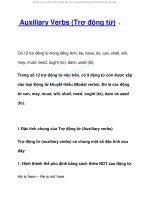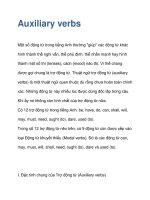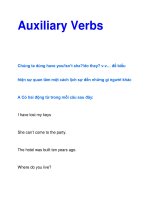Modal auxiliary verbs and principal verbs differences
Bạn đang xem bản rút gọn của tài liệu. Xem và tải ngay bản đầy đủ của tài liệu tại đây (15.54 KB, 2 trang )
Modal Auxiliary Verbs and Principal Verbs – Differences
The special verbs can, could, may, might, will, would, shall, should, must, ought, dare and need are called
modal auxiliary verbs.
Modal auxiliary verbs have three main characteristics.
1) They are never used alone.
A modal auxiliary verb cannot be used alone. A principal verb is either present or implied.
He will come. (Will – modal; come – principal)
She can go. (Will – modal; go – principal)
You should wait.
Principal verbs, on the other hand, can stand alone.
He came.
She went to the market.
I waited for two hours.
2) The modal auxiliaries do not change their form, whatever be the number and person of the subject.
I can write. You can write. They can write. We can write. She can write.
Primary auxiliaries change their form according to the number and person of the subject.
He is writing. They are writing. We are writing. I was writing.
I do agree. He does agree. You do agree.
Principal verbs also have a different form in the third person.
I work. You work. He works.
I write. You write. He writes.
3) Modal auxiliaries do not have infinitive or participle forms. You cannot say: to shall, to must or to can.
In the same way, you cannot add -ing to any of these auxiliaries to make present participles. Modal auxiliaries
do not have past participles either.
Notes
When you say to will, to need or to dare, the verbs will, need and dare are principal verbs, and not auxiliaries.
Similarly, when you say willing, needing and daring, the verbs will, need and dare are used as principal verbs,
and not auxiliaries.
Primary auxiliaries have infinitive and participle forms.
Infinitives
She wants to be promoted.
She seems to have gone.
Present participle
He is being followed.
Having lost the war, Germany surrendered.
Past participle
She has been promoted.
Stay on top of your writing! Download our grammar guide from www.englishgrammar.org to stay up-to-date.
Powered by TCPDF (www.tcpdf.org)









